Tag Archives: Lord’s Resistance Army
Posted on May 5, 2016 by Sophie Hicks
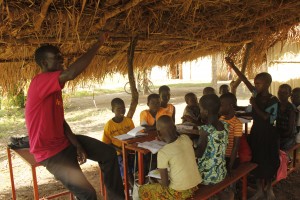 In rural Nwoya district, Northern Uganda, many children are not in school. Some have dropped out – others have never been to school at all. The reasons for dropping out are myriad. Some families do not have enough money to pay the fees for multiple children at school, as well as school uniform and scholastic materials. Other children are required to stay at home to care for sick relatives or help with household chores.
In rural Nwoya district, Northern Uganda, many children are not in school. Some have dropped out – others have never been to school at all. The reasons for dropping out are myriad. Some families do not have enough money to pay the fees for multiple children at school, as well as school uniform and scholastic materials. Other children are required to stay at home to care for sick relatives or help with household chores.
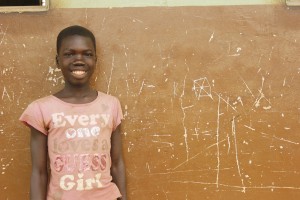 Molly (right) is one young girl who, at 13 years old, had never been to school until she enrolled in Speed School. Her uncle, who she lives with, did not allow her to go to school; instead she stayed at home to do most of the cooking and cleaning. And hers is not an isolated case. Sarah, also 13, had to drop out of school when her father spent all the money meant for school fees on the bride price for Sarah’s step mother. Paying dowry is still a tradition in northern Uganda and often impoverishes families. After the money had been used on his new bride, Sarah’s father asked her and her 4 siblings to stay at home until he found the money for their education. 3 are now enrolled in Speed School, which is a free initiative.
Molly (right) is one young girl who, at 13 years old, had never been to school until she enrolled in Speed School. Her uncle, who she lives with, did not allow her to go to school; instead she stayed at home to do most of the cooking and cleaning. And hers is not an isolated case. Sarah, also 13, had to drop out of school when her father spent all the money meant for school fees on the bride price for Sarah’s step mother. Paying dowry is still a tradition in northern Uganda and often impoverishes families. After the money had been used on his new bride, Sarah’s father asked her and her 4 siblings to stay at home until he found the money for their education. 3 are now enrolled in Speed School, which is a free initiative.
The reasons why children have dropped out of school are complex and difficult to address. But now a new initiative called Speed School, implemented by African Revival in partnership with Geneva Global, is aiming to get these drop outs back into school. The Speed School programme was previously implemented by Geneva Global in Ethiopia. The project was such a success that it was brought to Uganda and adapted to the national education system. African Revival is now managing 30 Speed School classes, each with 25 pupils. Over one year, we aim to educate and reintroduce 750 pupils into mainstream education and address the root causes of primary school drop outs and absenteeism.
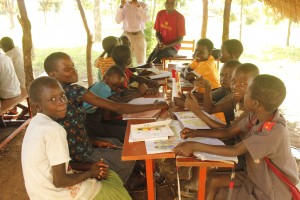 Speed School is an accelerated learning programme which will teach children the first 3 years of the primary curriculum, after which they will re-join the formal education system in Grade 4. Children are taught using effective participatory and child-centred learning methods which the Speed School teachers (called facilitators) learned during an intensive training session at the start of the project. The facilitators are also taught different ways to lesson plan, make learning aids, and encouraged to place an emphasis on critical thinking skills in class. Reduced class sizes of 25 pupils (the average teacher-pupil ratio in government schools is 1:80) also makes classes easier to manage and improves behaviour and pupil motivation. Moreover, the facilitators are from the local community, so as well as teaching the condensed curriculum, they can also monitor their pupils to ensure that they stay in Speed School and do not drop out again.
Speed School is an accelerated learning programme which will teach children the first 3 years of the primary curriculum, after which they will re-join the formal education system in Grade 4. Children are taught using effective participatory and child-centred learning methods which the Speed School teachers (called facilitators) learned during an intensive training session at the start of the project. The facilitators are also taught different ways to lesson plan, make learning aids, and encouraged to place an emphasis on critical thinking skills in class. Reduced class sizes of 25 pupils (the average teacher-pupil ratio in government schools is 1:80) also makes classes easier to manage and improves behaviour and pupil motivation. Moreover, the facilitators are from the local community, so as well as teaching the condensed curriculum, they can also monitor their pupils to ensure that they stay in Speed School and do not drop out again.
As well as Speed School classes, Geneva Global have also established self-help groups for the parents of the enrolled pupils. In these groups parents – primarily mothers – will be trained in Income Generating Activities to economically empower them so they are able to meet the financial demands of educating their children. These activities may include Village Savings and Loans Associations (VSLA), agriculture or business activities.
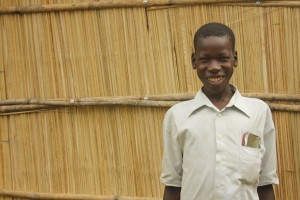 By ensuring the parents are empowered economically, the Speed School programme aims to address one of the main reasons why children dropped out of school in the first place: lack of money for school fees. Even if parents want their children to gain an education, school is not always a priority. Richard, a bright-eyed 13 year-old, dropped out of school in 2012 because both of his parents had died. He now lives with his grandmother, and has a hand-to-mouth existence: his grandmother is frail and can only generate enough money to feed Richard. No money is left for school fees. But now Speed School is helping Richard to study again and get an education, so one day he can achieve his dream of becoming a pilot: “I want to be a pilot so I can move in different places, and learning ways of living and different cultures”. Motivated and focus, we are sure Richard, along with the other children in Speed School, will excel this year in this supportive programme and go on to succeed in the future.
By ensuring the parents are empowered economically, the Speed School programme aims to address one of the main reasons why children dropped out of school in the first place: lack of money for school fees. Even if parents want their children to gain an education, school is not always a priority. Richard, a bright-eyed 13 year-old, dropped out of school in 2012 because both of his parents had died. He now lives with his grandmother, and has a hand-to-mouth existence: his grandmother is frail and can only generate enough money to feed Richard. No money is left for school fees. But now Speed School is helping Richard to study again and get an education, so one day he can achieve his dream of becoming a pilot: “I want to be a pilot so I can move in different places, and learning ways of living and different cultures”. Motivated and focus, we are sure Richard, along with the other children in Speed School, will excel this year in this supportive programme and go on to succeed in the future.
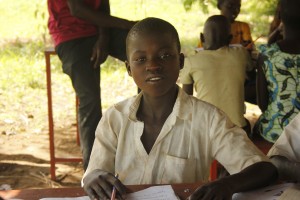
Posted in News |
Tagged Acholi, African Revival, Changemaker, Education, Gulu, Headteacher, inspiration, Inspiring Head Teacher, International Development, Lord's Resistance Army, Northern Uganda, Nursery School, School Development, Teacher training |
Leave a comment
Posted on April 11, 2016 by Sophie Hicks
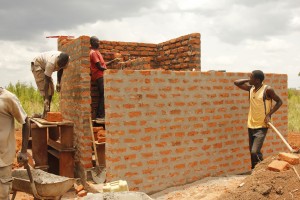 At African Revival, we always ask the communities who benefit from our construction projects to make a contribution. This can be either financial or in the form of labour and resources. But why ask for this contribution? Why is it important for the success of the project? In this article, we explore the benefits of community contribution and ask Construction Coordinator Vincent about what motivates parents to contribute.
At African Revival, we always ask the communities who benefit from our construction projects to make a contribution. This can be either financial or in the form of labour and resources. But why ask for this contribution? Why is it important for the success of the project? In this article, we explore the benefits of community contribution and ask Construction Coordinator Vincent about what motivates parents to contribute.
When an outside organisation comes into a rural community to work on a construction project, there is a risk that the community members see the building as belonging to an outside agency. Often this means that they do not have a feeling of responsibility towards it and in many cases do not properly maintain it. They see this as the duty of the outside organisation. This can mean construction projects fall into disrepair and are not sustainable in the long term.
In order for the community to properly maintain a building, they must feel some sense of ownership towards it. Community contribution of money, labour or resources can help generate this sense of ownership and make a project more sustainable, as Construction Coordinator Vincent explains: “If the community make a contribution, the sense of ownership gets into them. In most interventions that have been going on in the construction industry, we realise that after a while the community still doesn’t own the place, even if you hand over officially to them. So we want them to own the latrine, right from the onset”
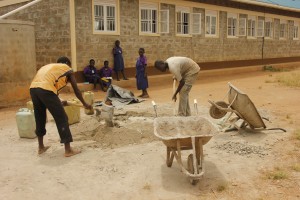 This sense of ownership can be generated by involving the community members right from the start, by consulting them about their real needs, involving them in the planning process and asking them what they can realistically contribute. A community in a rural setting may want to contribute building materials sourced from the local environment, which costs them nothing, while a town-based community may not have access to natural building materials and may choose instead to contribute in cash. Whatever the contribution, it encourages a sense of duty and pride towards the new facility, as Vincent describes: “If they contribute, the community feels more ownership than when someone just gives it to them. So that means if the facilities are completed they will take care of it. They will try to see that nobody messes it up. If there is any burglary, they are willing to take care of the security. They rejoice at the end of the day that this is their labour, their contribution. They feel proud that they have contributed for the construction of a classroom, now their children are able to use the facility”
This sense of ownership can be generated by involving the community members right from the start, by consulting them about their real needs, involving them in the planning process and asking them what they can realistically contribute. A community in a rural setting may want to contribute building materials sourced from the local environment, which costs them nothing, while a town-based community may not have access to natural building materials and may choose instead to contribute in cash. Whatever the contribution, it encourages a sense of duty and pride towards the new facility, as Vincent describes: “If they contribute, the community feels more ownership than when someone just gives it to them. So that means if the facilities are completed they will take care of it. They will try to see that nobody messes it up. If there is any burglary, they are willing to take care of the security. They rejoice at the end of the day that this is their labour, their contribution. They feel proud that they have contributed for the construction of a classroom, now their children are able to use the facility”
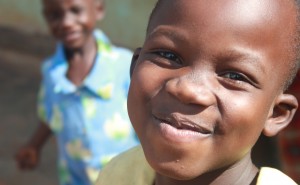 Voluntary provision of labour, time, money and materials can also help to break patterns of dependency and passivity. If the community knows that in order to benefit from a construction project, they will also need to contribute, this can help to counteract a hand-out culture inspired by decades of free projects and facilities. Involving a community in the planning and implementation process can also empower individuals by giving them decision-making power over their own futures, as well as imparting new knowledge and skills – for instance knowledge about proper planning or new construction skills. All these factors contribute to the long term sustainability of the project by encouraging responsibility amongst the community and giving them the skills they need to properly maintain a construction project.
Voluntary provision of labour, time, money and materials can also help to break patterns of dependency and passivity. If the community knows that in order to benefit from a construction project, they will also need to contribute, this can help to counteract a hand-out culture inspired by decades of free projects and facilities. Involving a community in the planning and implementation process can also empower individuals by giving them decision-making power over their own futures, as well as imparting new knowledge and skills – for instance knowledge about proper planning or new construction skills. All these factors contribute to the long term sustainability of the project by encouraging responsibility amongst the community and giving them the skills they need to properly maintain a construction project.
But what motivates a community to contribute? According to Vincent, it is a desire to see the best for all the members of that community, and in the case of school construction projects, a better future for their children:“Some may want their children to be in a safe environment. If the environment is good, that means the education is better. Most importantly, it is about the future of the children who attend the school. The community want to see a child have a better future. If there is anything that they can do, like development fees, like personal labour – that is the driving force that makes community members give contributions”
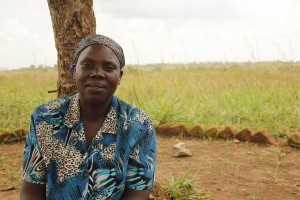 Community member Christine, a parent at Teddi Community School where African Revival recently constructed a new block of latrines, agrees: “We don’t contribute because of a penalty or a demand. We contribute because we want to see this school and community development and want to be part of that process.” At Teddi, the parents contributed 1000UGX for each of their children enrolled at the school. They also signed a maintenance agreement with African Revival, which hands over responsibility for all upkeep to the School Management Committee. While we will always be there to offer support to this particular community, they are motivated to care for the facility because it has improved sanitation at the school, especially for the female pupils, as parent Sharon explains: “I was happy to contribute to the latrine. Now our girls have more privacy”.
Community member Christine, a parent at Teddi Community School where African Revival recently constructed a new block of latrines, agrees: “We don’t contribute because of a penalty or a demand. We contribute because we want to see this school and community development and want to be part of that process.” At Teddi, the parents contributed 1000UGX for each of their children enrolled at the school. They also signed a maintenance agreement with African Revival, which hands over responsibility for all upkeep to the School Management Committee. While we will always be there to offer support to this particular community, they are motivated to care for the facility because it has improved sanitation at the school, especially for the female pupils, as parent Sharon explains: “I was happy to contribute to the latrine. Now our girls have more privacy”.
Overall, community contribution to construction projects ensures the long term sustainability of that project, while also giving communities more authority over their own development and futures.
Posted in News |
Tagged African Revival, community contribution, community development, Development, Education, Gulu, inspiration, International Development, Lord's Resistance Army, School Development, Teacher training |
Leave a comment
Posted on March 14, 2016 by Elaine Miller
Head Teacher Geoffrey was posted to a rural school in Northern Uganda after the 20 year insurgency by the Lord’s Resistance Army. Over the last few years he has transformed his school.
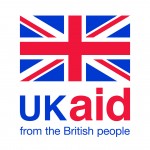
Koch Goma Primary School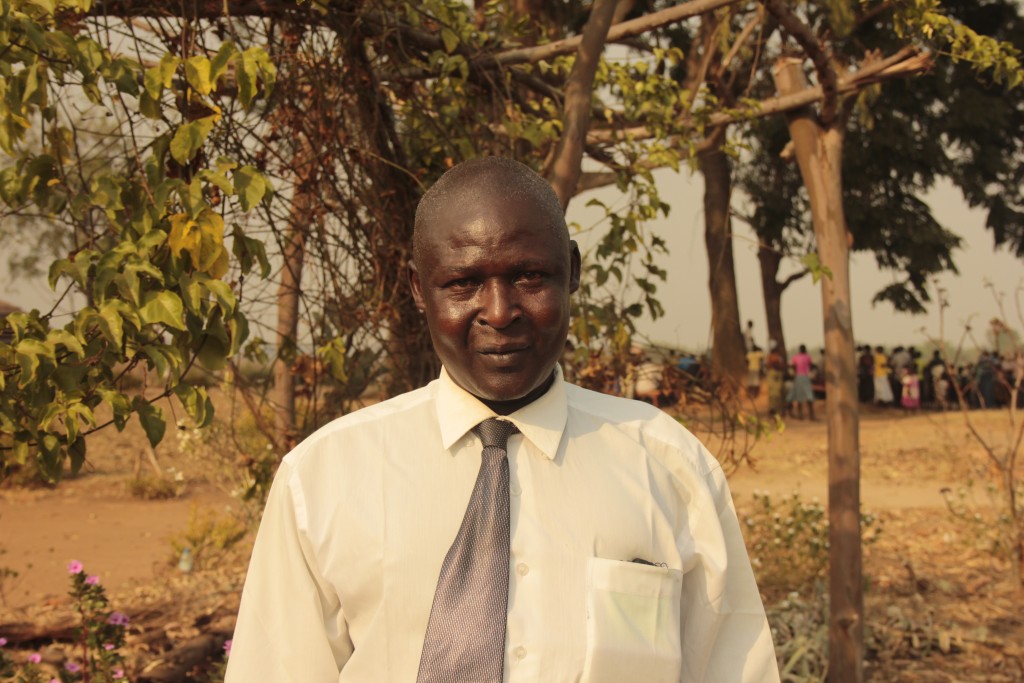
This is my fifth year at Koch Goma Primary School. Before the insurgency by the Lord’s Resistance Army, this school was one of the best in the country. But 20 years of insurgency brought it to the ground. All the books were destroyed, all the desks were destroyed, all the school assets were destroyed.
For several years during the insurgency, the school was transferred to Gulu town, about 27km away, for safety. Later, the school returned to this site. But this site had become an Internally Displaced People’s Camp. All the parents, teachers and pupils had been moved into the camp and this changed the culture of the school. Teachers had become undisciplined, they didn’t want to teach and they didn’t want to plan. The children were so undisciplined. The syllabus was never completed. You would find a child in Year 6 who couldn’t even write his name.
Special Assignment
I was posted here on a special assignment to restore the school. Before I was posted, there were 3 other Head Teachers who refused the posting. In 2011, two teachers were beaten by children. Teachers started to fear pupils. Parents had lost all faith in the school. This was a place that was not a school. When I started, some children tried to beat me. But I said to them, “I have not come to fight. I have come so one day you can be a Minister. I have come so one day you can be a Doctor. I have come so you can be an important person, a person we can respect.”
Then I said to the District Education Officer, “Give me four years”. I wanted to work on changing attitudes and this takes time. So I put in place three strategies.
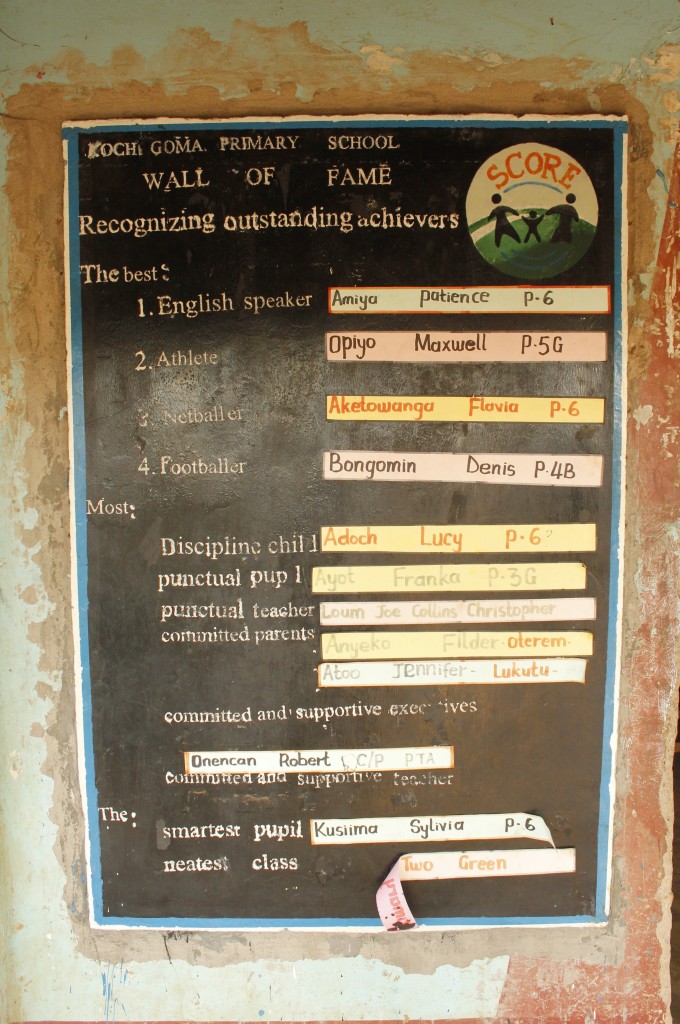 Three Strategies
Three Strategies
The first was simple, to change the physical layout of the school. I created paths, planted flowerbeds and I bought classroom doors. I painted the classrooms and I put posters up. I built a football pitch and a netball pitch, space for young children too and for free games. When the parents saw how the school was looking, they started feeling positive. They were coming to love the school.
My second strategy was to change the way money was used in the school. I researched a local financial institution called The Circle. Then I negotiated with the School Management Committee and the Parent Teacher Association to bank our money there. I said, “We don’t want to handle money in the school. When the parents come to pay fees, we want them to pick up a slip, and deposit the money in The Circle”. When the various school departments need money, they fill out a request slip. I verify the request with the PTA Chair and the School Treasurer and we withdraw the money from The Circle. We keep receipts for all transactions. When the parents saw this, they said, “Our money is safe”.
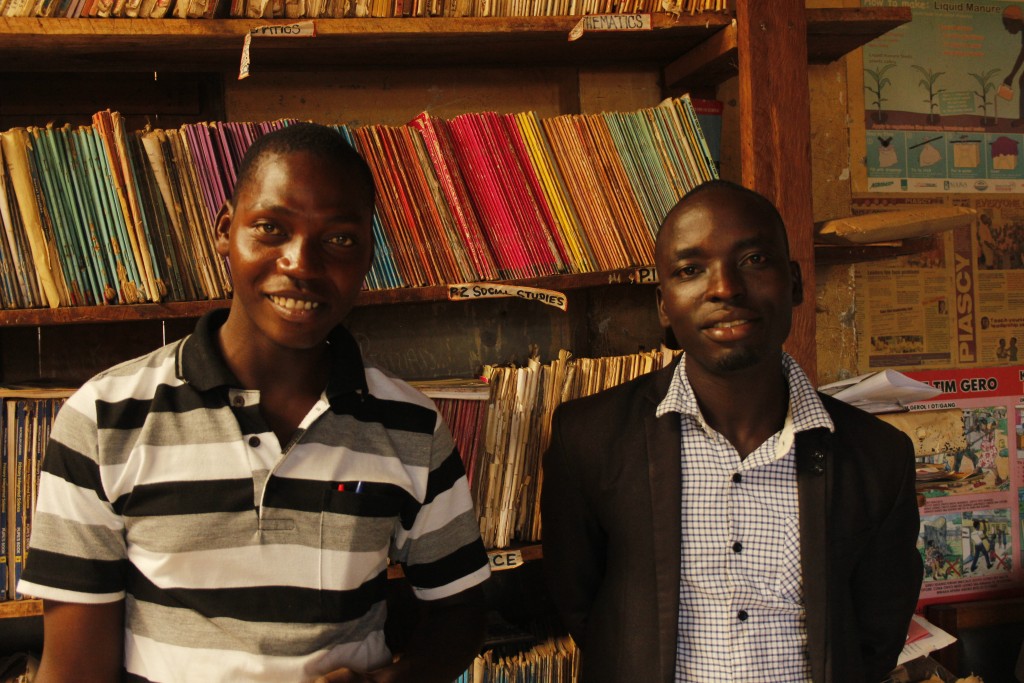 The third thing I did was to train teachers. We found the children couldn’t read or write, and then we went to the teachers and we found the teachers couldn’t read or write. So we began with the teachers. I was a tutor myself [someone who trains teachers at a Teacher Training College] for four years, so I also trained them on professional ethics and code of conduct. Then we negotiated with the parents to send their children in on Saturdays, and we asked the District Education Officer to let us stay open during holidays. We used this time to catch up on the syllabus.
The third thing I did was to train teachers. We found the children couldn’t read or write, and then we went to the teachers and we found the teachers couldn’t read or write. So we began with the teachers. I was a tutor myself [someone who trains teachers at a Teacher Training College] for four years, so I also trained them on professional ethics and code of conduct. Then we negotiated with the parents to send their children in on Saturdays, and we asked the District Education Officer to let us stay open during holidays. We used this time to catch up on the syllabus.
Our results
We are very happy because last year we heard our Primary Leaving Exam results were the best in the district. Our challenge now is classrooms. Parents have rushed to register their children here for the new school year, but we don’t have space so we turn some away. We have 1,200 children registered for 2016, plus 200 more in the nursery section. The District Education Officer said if we had more classrooms, they would send us more teachers.
All in all, I am trying to create teamwork. I am trying to encourage people to feel responsible for what is happening in the school. Then when we are successful, it is a success for the whole team. In everything I’m doing, I’m trying to involve people. I don’t do it alone and that’s why we are successful. I hope our school will continue leading!
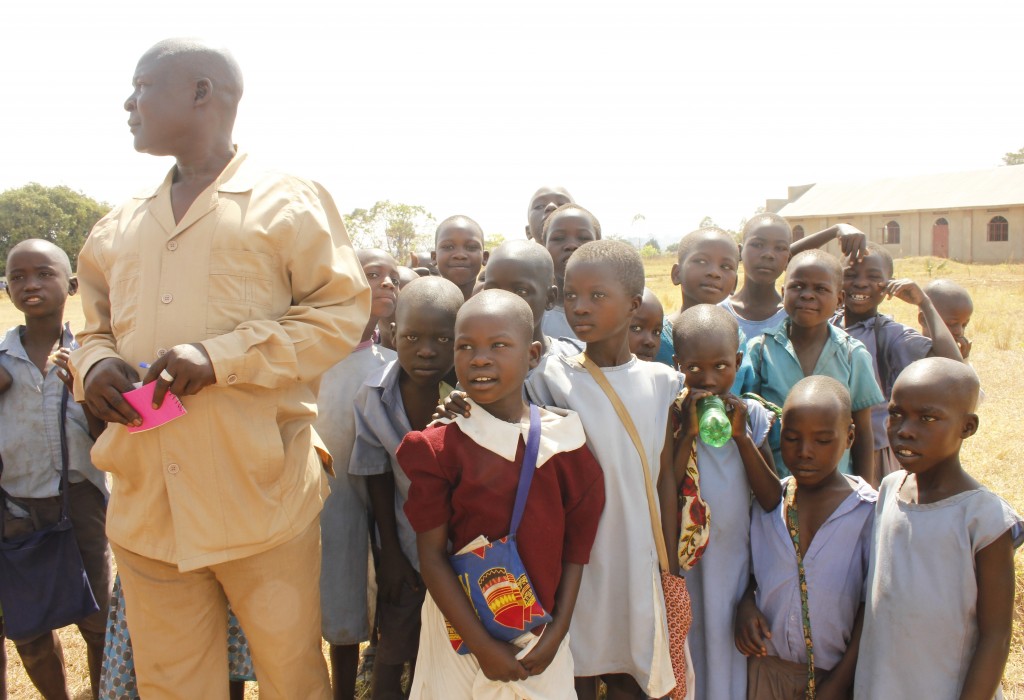
Posted in News |
Tagged Education, Head Teacher, Inspiring Head Teachers, Lord's Resistance Army, Uganda |
Leave a comment
 In rural Nwoya district, Northern Uganda, many children are not in school. Some have dropped out – others have never been to school at all. The reasons for dropping out are myriad. Some families do not have enough money to pay the fees for multiple children at school, as well as school uniform and scholastic materials. Other children are required to stay at home to care for sick relatives or help with household chores.
In rural Nwoya district, Northern Uganda, many children are not in school. Some have dropped out – others have never been to school at all. The reasons for dropping out are myriad. Some families do not have enough money to pay the fees for multiple children at school, as well as school uniform and scholastic materials. Other children are required to stay at home to care for sick relatives or help with household chores. Molly (right) is one young girl who, at 13 years old, had never been to school until she enrolled in Speed School. Her uncle, who she lives with, did not allow her to go to school; instead she stayed at home to do most of the cooking and cleaning. And hers is not an isolated case. Sarah, also 13, had to drop out of school when her father spent all the money meant for school fees on the bride price for Sarah’s step mother. Paying dowry is still a tradition in northern Uganda and often impoverishes families. After the money had been used on his new bride, Sarah’s father asked her and her 4 siblings to stay at home until he found the money for their education. 3 are now enrolled in Speed School, which is a free initiative.
Molly (right) is one young girl who, at 13 years old, had never been to school until she enrolled in Speed School. Her uncle, who she lives with, did not allow her to go to school; instead she stayed at home to do most of the cooking and cleaning. And hers is not an isolated case. Sarah, also 13, had to drop out of school when her father spent all the money meant for school fees on the bride price for Sarah’s step mother. Paying dowry is still a tradition in northern Uganda and often impoverishes families. After the money had been used on his new bride, Sarah’s father asked her and her 4 siblings to stay at home until he found the money for their education. 3 are now enrolled in Speed School, which is a free initiative. Speed School is an accelerated learning programme which will teach children the first 3 years of the primary curriculum, after which they will re-join the formal education system in Grade 4. Children are taught using effective participatory and child-centred learning methods which the Speed School teachers (called facilitators) learned during an intensive training session at the start of the project. The facilitators are also taught different ways to lesson plan, make learning aids, and encouraged to place an emphasis on critical thinking skills in class. Reduced class sizes of 25 pupils (the average teacher-pupil ratio in government schools is 1:80) also makes classes easier to manage and improves behaviour and pupil motivation. Moreover, the facilitators are from the local community, so as well as teaching the condensed curriculum, they can also monitor their pupils to ensure that they stay in Speed School and do not drop out again.
Speed School is an accelerated learning programme which will teach children the first 3 years of the primary curriculum, after which they will re-join the formal education system in Grade 4. Children are taught using effective participatory and child-centred learning methods which the Speed School teachers (called facilitators) learned during an intensive training session at the start of the project. The facilitators are also taught different ways to lesson plan, make learning aids, and encouraged to place an emphasis on critical thinking skills in class. Reduced class sizes of 25 pupils (the average teacher-pupil ratio in government schools is 1:80) also makes classes easier to manage and improves behaviour and pupil motivation. Moreover, the facilitators are from the local community, so as well as teaching the condensed curriculum, they can also monitor their pupils to ensure that they stay in Speed School and do not drop out again. By ensuring the parents are empowered economically, the Speed School programme aims to address one of the main reasons why children dropped out of school in the first place: lack of money for school fees. Even if parents want their children to gain an education, school is not always a priority. Richard, a bright-eyed 13 year-old, dropped out of school in 2012 because both of his parents had died. He now lives with his grandmother, and has a hand-to-mouth existence: his grandmother is frail and can only generate enough money to feed Richard. No money is left for school fees. But now Speed School is helping Richard to study again and get an education, so one day he can achieve his dream of becoming a pilot: “I want to be a pilot so I can move in different places, and learning ways of living and different cultures”. Motivated and focus, we are sure Richard, along with the other children in Speed School, will excel this year in this supportive programme and go on to succeed in the future.
By ensuring the parents are empowered economically, the Speed School programme aims to address one of the main reasons why children dropped out of school in the first place: lack of money for school fees. Even if parents want their children to gain an education, school is not always a priority. Richard, a bright-eyed 13 year-old, dropped out of school in 2012 because both of his parents had died. He now lives with his grandmother, and has a hand-to-mouth existence: his grandmother is frail and can only generate enough money to feed Richard. No money is left for school fees. But now Speed School is helping Richard to study again and get an education, so one day he can achieve his dream of becoming a pilot: “I want to be a pilot so I can move in different places, and learning ways of living and different cultures”. Motivated and focus, we are sure Richard, along with the other children in Speed School, will excel this year in this supportive programme and go on to succeed in the future.









